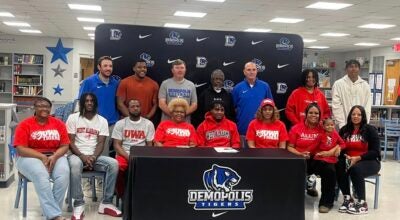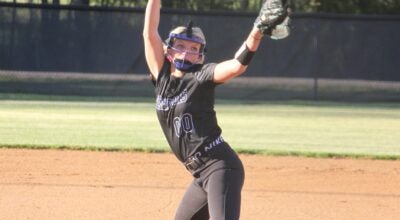UWA implements athletic training outreach program
Published 2:13 pm Thursday, July 29, 2010
LIVINGSTON – The University of West Alabama recently established an athletic training outreach program serving nearly 40 schools in the Black Belt region, thanks to a gift to “The University We Will Be” campaign provided by Dr. Lyle Cain, team orthopaedist and medical director; Champion Sports Medicine; and St. Vincent’s Health System.
The outreach program provides support and education for athletic training programs in public and private high schools in Choctaw, Clarke, Dallas, Greene, Hale, Marengo, Perry, Pickens, Sumter, Washington and Wilcox counties.
The program aims to improve the evaluation, treatment, rehabilitation, and referral of injuries and illnesses by working with administrators, coaches, and local health care providers to increase the level and availability of athletic training services within the schools.
“Many of these schools, located in rural counties, had no access to athletic training service prior to the implementation of UWA’s outreach program,” said Dr. R. T. Floyd, professor and chair of the Department of Physical Education and Athletic Training. “We hope to raise the consciousness of the need for quality health care for student-athletes provided by a certified athletic trainer.”
“The University is pleased with the improvements in health care we have provided for these schools so far, and we look forward to continuing to serve our region, thanks to the generosity of our program partners,” he continued.
UWA’s Athletic Training and Sports Medicine Center, established in 1986 to improve athletic health care in West Alabama through education, oversees the program. The Center is staffed by full-time certified athletic trainers, graduate assistants, and athletic training students, with support personnel including orthopaedists, family practice physicians, physical therapists, exercise physiologists, biomechanists, health and physical educators, and others in related areas.
“This program is important outreach for all of the doctors at Andrews Sports Medicine and continues our commitment to deliver quality orthopedic care to young people across the state, first implemented by Dr. James Andrews when he came to Alabama in 1986,” said Cain, who founded Birmingham’s Andrews Sports Medicine and Orthopaedic Center. “This program provides a certified athletic trainer to help with education, prevention and injury evaluation for dozens of underserved schools in west Alabama, and I believe that this program is critical to improving the medical care of thousands of student-athletes, ultimately helping prevent potential life-changing injuries.”
Assistant Athletic Trainer Jamie Hibbert visits each partnering school approximately once a week to help develop and improve the total athletic health care program.
“Besides treating injuries, I have emphasized relationship building with coaches, who are sometimes skeptical because they think I’m going to tell them their players need to take time off,” she said. “After realizing that my goal is to keep their players on the field and to return injured players to action as quickly and safely as possible, coaches see that the rehabilitation I recommend really works for their benefit by decreasing the number of days lost due to injury.”
Floyd says the program’s ultimate goal is placing a certified athletic trainer in each school, ensuring students receive appropriate care to reduce injury rates, expediently manage injuries, and return quickly to safe participation.
“The more UWA educates parents and administrators, the more success we will have in placing athletic trainers in these schools as full-time staff members,” he said. “The education has to take place before the real need is realized, in many cases.”
Hibbert added, “Injury prevention is our first goal as athletic trainers, and if we can accomplish this by simply teaching people better ways to run a sports program, we all win.”
As part of the program’s mission in the schools, Hibbert also assists in equipping athletic training rooms, securing team physicians and medical coverage at sporting events, and involving high school athletic training students in team care.
Students in UWA’s nationally accredited program, which emphasizes practical clinical experience and professional course work, also assist in local schools to gain experience dealing with a variety of sports-related injuries in different settings.
Hibbert says she is excited about the future of the program.
“The first year has been a learning experience, and the University can use these lessons to more effectively reach student-athletes and everyone involved in their care,” Hibbert said.
“The University We Will Be” campaign is an ongoing initiative to raise $15 million in gifts and pledges by 2012 for the University of West Alabama. These funds will improve campus facilities, provide scholarships, enhance the campus learning environment, support the faculty and fund community outreach projects.





